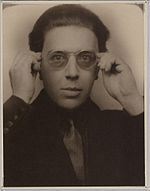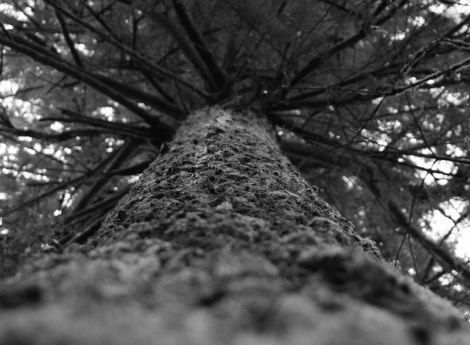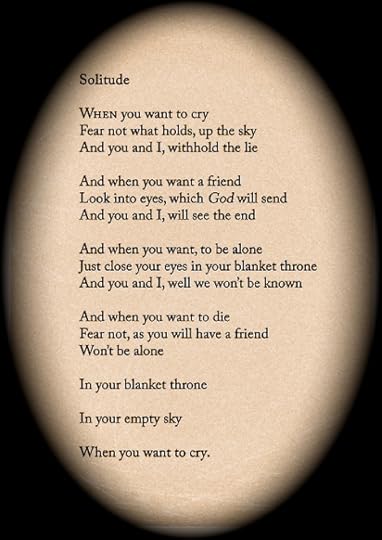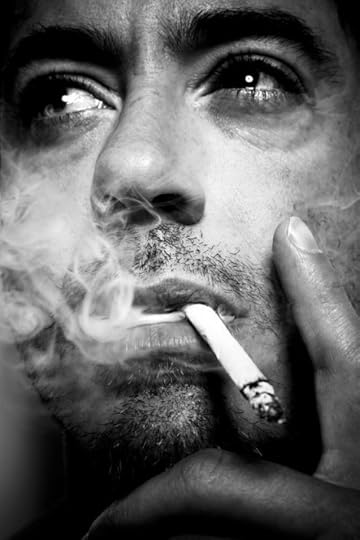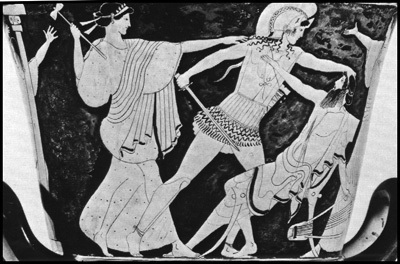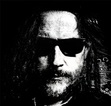R.M. Engelhardt's Blog: Burn Brightly, page 37
April 9, 2013
Baudelaire …
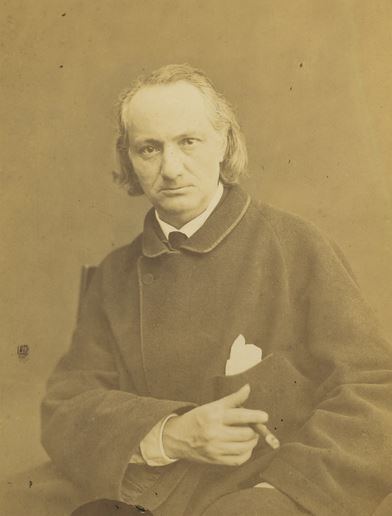
If the word doesn’t exist, invent it; but first be sure it doesn’t exist.”
~ Charles Baudelaire
Born Today In 1821 …
Le Chat
Viens, mon beau chat, sur mon coeur amoureux;
Retiens les griffes de ta patte,
Et laisse-moi plonger dans tes beaux yeux,
Mêlés de métal et d’agate.
Lorsque mes doigts caressent à loisir
Ta tête et ton dos élastique,
Et que ma main s’enivre du plaisir
De palper ton corps électrique,
Je vois ma femme en esprit. Son regard,
Comme le tien, aimable bête
Profond et froid, coupe et fend comme un dard,
Et, des pieds jusques à la tête,
Un air subtil, un dangereux parfum
Nagent autour de son corps brun.
— Charles Baudelaire
The Cat
Come, superb cat, to my amorous heart;
Hold back the talons of your paws,
Let me gaze into your beautiful eyes
Of metal and agate.
When my fingers leisurely caress you,
Your head and your elastic back,
And when my hand tingles with the pleasure
Of feeling your electric body,
In spirit I see my woman. Her gaze
Like your own, amiable beast,
Profound and cold, cuts and cleaves like a dart,
And, from her head down to her feet,
A subtle air, a dangerous perfume
Floats about her dusky body.


April 8, 2013
SURREALISM WILL …
SURREALISM WILL USHER YOU INTO DEATH, WHICH IS A SECRET SOCIETY. IT WILL GLOVE YOUR HAND, BURYING THEREIN THE PROFOUND M WITH WHICH THE WORD MEMORY BEGINS. DO NOT FORGET TO MAKE PROPER ARRANGEMENTS FOR YOUR LAST WILL AND TESTAMENT: SPEAKING PERSONALLY, I ASK THAT I BE TAKEN TO THE CEMETERY IN A MOVING VAN. MAY MY FRIENDS DESTROY EVERY LAST COPY OF THE PRINTING OF THE SPEECH CONCERNING THE MODICUM OF REALITY.
~ ANDRÉ BRETON, THE SURREALIST MANIFESTO


April 7, 2013
spring
Denis Devlin ~ Poet
Denis Devlin was born on April 15, 1908, in Greenock, Scotland, of Irish parents.
He entered the Irish diplomatic service in 1935 and served in Europe and the United States, before being appointed minister plenipotentiary to Italy in 1950; he was accredited also to Turkey 1951, and was ambassador to Italy 1958.
Admired by Beckett, who described him as ‘without question the most interestering of the youngest generation of Irish poets’, his books are Poems (with Brian Coffey, privately printed, Dublin, 1930); Intercessions (London, Europa Press, 1937); Lough Derg and Other Poems (New York, Reynal & Hitchcock, 1946); Exile and Other Poems (New York, Pantheon Books, 1949); Memoirs of a Turcoman Diplomat (Rome, Botteghe Oscure XXIV, 1959); and his posthumous Selected Poems (New York: Holt, Rinehart & Winston, 1963). The Complete Poems of Dennis Devlin, edited with an introduction by Brian Coffey, was published in the University Review, Dublin, Volume III, number 5 (no date given), and by The Dolmen Press, Dublin, 1964.
His later posthumous books are Selected Poems (Dublin, New Writers’ Press, 1971); Collected Poems, edited by J.C.C. Mays (Dublin, Dedalus Press,1989); and Translations into English [from French, German and Italian poetry] edited by Roger Little (Dedalus Press, 1992).
He died in Dublin in 1959.


April 6, 2013
Alan Moore’s Advice To Writers …
Radauskas
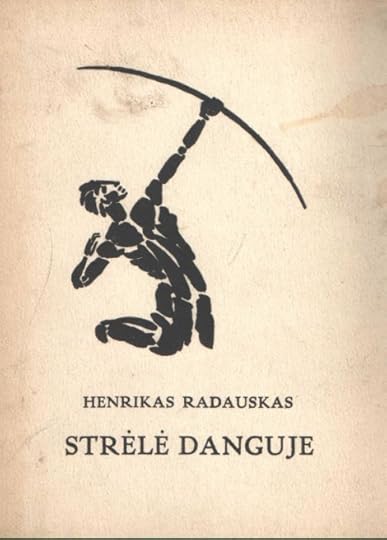 A MECHANICAL ANGEL
A MECHANICAL ANGELA mechanical angel’s duties are not difficult: Govern lightning bolts, bring bread and wine, Watch through the window how flames climb the walls, Talk with street lamps about old times. A mechanical angel’s duties are not difficult: Feed chimeras in the tower every hundred years, Step softly so the metal will not clang, Cloak freezing caryatids with fog. A mechanical angel’s duties are difficult: Blocade the door, do not let Death in, And if she enters, show her a sleeping brother And convince her he doesn’t have a soul.
Translated by Jonas Zdanys
What is the limit of human endurance, what tools do we have to fight against the forces that seek to overwhelm us – these are the impossible questions the Lithuanian poet Henrikas Radauskas once tried to answer. Radauskas is not read by anyone in the English-speaking world, and in truth he is now probably unknown to anyone outside his homeland. Yet his work is an example of the greatest determination, deserving to be read alongside that of Akhmatova and Mandelstam and the countless other poets who by intense labor sought out a measure of life in the midst of the unspeakable.
Born in 1910 in the city of Panevėžys in central Lithuania, the entirety of Radauskas’ life was determined by years of upheaval and devastation. As a youth he absorbed the writings of the French Romantics, the Russian symbolists, the Acmeists, the Polish poet Julian Tuwim; by the year of his death in 1970, had spent time as a teacher, a radio-announcer, a secretary, a manual laborer, and a librarian in Russia, Germany, Baltimore, Chicago, and Washington D.C. In 1946 he escaped from Soviet-occupied Berlin only to find himself in a displaced-persons camp where, under conditions of intense confinement, he resumed the artistic project he had been forced by war to set aside.
Four small volumes of poetry were published in Radauskas’ lifetime: Fontanas (The Fountain, 1935), Strėlė danguje (Arrow in the Sky, 1950), Žiemos daina (Winter Song, 1955), and Žaibai ir vėjai (Lightnings and Winds, 1965) and there is a notable fifteen-year gap between his first collection, made while still in Lithuania, and his second, produced by the émigré press abroad. To date only a single, slim collection has ever been available in the U.S., published by Wesleyan University Press in 1986 as part of a series under the title Chimeras In the Tower. The selections in that volume are divided between verse and prose and are frequently short, less than a page.
The entirety of a poem called “Winter and Summer” is this:
Everything was so warm and round:
Heaven and the sun, pears and grapes,
And the breasts of a young girl
Who waited for love in the shade of a cloud.
Autumn crushed the weeping grapes,
Winter strewed the fields with lime,
And the sun, dead bird of paradise,
Falls through my window like a stone.
Another, entitled “Speed” reads:
Pouring time and space into one straightaway, shivering in a great wind, speed, having smashed its steel hand across the landscape, sees that trees and poles, eyes shut with fear, fly screaming toward their inevitable destiny.
In both of these poems are the techniques that recur throughout Radauskas’ work: an aggressive, palpable sense of imagery, coupled with the description of a force beyond the reach of human comprehension. The reader finds little that is overtly specific, nothing unique – no places, houses, families, or towns are mentioned – everything presented in a simple, straightforward language that seems to strip the parts of things down to the element itself. And yet, despite this simplicity, everything is quite suddenly thrown on its end.
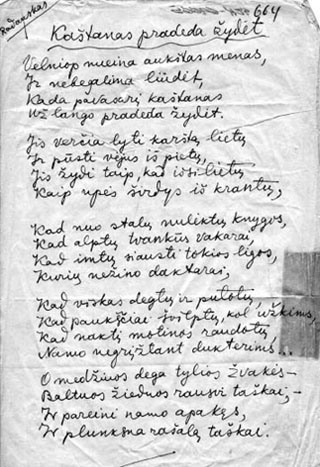
A poem titled “A Mechanical Angel,” presents a seemingly familiar myth:
A mechanical angel’s duties are not difficult:
Feed chimeras in the tower every hundred years,
Step softly so the metal does not clang,
Cloak freezing caryatids with fog.
That is immediately contradicted:
A mechanical angel’s duties are difficult:
Blockade the door, do not let Death in,
And if she enters, show her a sleeping brother,
And convince her he doesn’t have a soul.
This is a world in which the subjects are as condemned as the souls in Purgatory. That which is familiar is forever and inevitably subjected to a destabilizing paradox, as if the universe, being infinite, cannot yet be entirely determined.
In an essay, Radauskas’ translator Jonas Zdanys names his subject’ approach “applied aestheticism” – an attempt by the poet, in his view, to fashion a world beyond the reach of his terrible history and pain and freed from the sense of his world’s destruction. Zdanys uses as an example of purpose the poem “Arrow in the Sky”
I am an arrow that a child shot through
An apple tree in bloom beside the sea;
A cloud of apple blossoms, like a swan,
Has shimmered down and landed on a wave;
The child is wondering, he cannot tell
The blossoms from the foam.I am an arrow that a hunter shot
To hit an eagle that was flying by;
For all his strength and youth, he missed the bird,
Wounding instead the old enormous sun
And flooding all the twilight with its blood;
And now the day has died.I am an arrow that was shot at night
By a crazed soldier from a fort besieged
To plead for help from mighty heaven, but
Not having spotted God, the arrow still
Wanders among the frigid constellations,
Not daring to return.
Though Zdanys’ assessment overlooks, I think, the presence of destruction, he is perceptive in noting that Radauskas’ poems are otherwise not totally preoccupied with despair. They are not like those of Trakl or Baudelaire – there is still a sense, a very slight sense, that the future can be left unwritten (which is to say that the inverse might also be true: if the apocalypse is real, it may have already happened).
It is a sense of reflection after ending. Radauskas writes of eloquently in the poem “Muse”:
The dressmaker muse from Denis’s painting
Puts her sewing on the bench, rises,
Walks down an empty street of summer
Yellowed like a Chinese face.
The checkered dress begins to climb the stairs,
And beneath her feet an oak voice
Scans running words into iambs.She goes through the heavy sleeping door
Like the wind and suddenly
Grows like a statue in the room.
Seeing the blind stone face
The children scream and start to run,
But she throws the children out the window,
And the geranium and the canary,
And the infants, flapping their wings,
Set down like angels in the square.
The flower sings in the street like a bird
And the canary sprouts
A bright yellow blossom. And the stone
Hands the man a pen and a notebook
And languidly begins to dictate.
“The stone/Hands the man a pen and a notebook/And languidly begins to dictate.” There is no better personification for the unreasonableness of art.
In his lifetime Radauskas translated into Lithuanian the writers Martin du Gard, Thomas Mann, Stefan Zweig, Verlaine, Heine, Goethe, and Achmatova. His poems have been translated into English, Latvian, Estonian, Finnish, Polish, and German.
Readers unfamiliar with mid-century Lithuanian poetry might find the introduction to Chimeras In the Tower useful: Zdanys provides a summary of the history of the Lithuanian language and its idiosyncrasies in syntax.
Some of the poems of Chimeras have been included alongside uncollected poems here
Source:
http://writersnoonereads.tumblr.com/post/43679161606/the-following-is-a-submission-from-c-torre-who


April 5, 2013
“Nicotine and alcohol embraced in my system like long-pa...
“Nicotine and alcohol embraced in my system like long-parted siblings,
grateful to me for reuniting them.”
~ Glen Duncan
_____________

April 4, 2013
The School of Night Poetry Open Mic is Back in Session
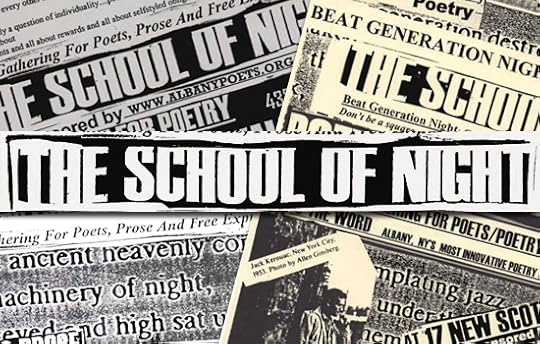
http://www.newversemovement.com
On Tuesday we told you about the upcoming Frequency North reading on April 11 and how Thursday nights are very busy in the poetry world here in Albany. Well, there is even more going on next Thursday evening as R.M. Engelhardt is resurrecting the School of Night poetry open mic at the Pearl Street Pub in downtown Albany.
This open mic series has come and gone a few times over the years. Before Nitty Gritty Slam was at Valentine’s, the School of Night was the monthly poetry reading at the club. After leaving the New Scotland Ave. venue, the series moved to a couple other places in the city including The Fuze Box, Ballingers (now the City Beer Hall), and Red Square. Most recently Rob was the host of the Saint Poem Reading Series at the UAG Gallery on Lark Street.
We sat down with Engelhardt to get more information about why he is starting the series up again, what makes the School of Night so different from the other mics in the area, and why is moving downtown to Pearl Street.
It’s in the air, things … the feel of poetry is changing and everything is in a way for the 21st century just starting to change. When I was hosting “Saint Poem” at the UAG something was missing and it somehow didn’t feel right. I thought that the location was helpful on Lark Street but it wasn’t getting enough public notice. Granted, poetry readings, open mics here in Albany are plentiful but in order to create a successful one you need the right place and the right atmosphere to truly bring it to into life. The Pearl Street Pub-Dirty Martini Lounge has that right feeling … it’s the right place for it downtown. The School Of Night has always been more, was always more than just a open mic or poetry reading but symbolic of exactly the people & the original purpose the group was formed for by Kit Marlowe, Doctor Dee and Sir Walter Raleigh in the late 1500s England. To share words & ideas, free verse & free thought. It has an air of mystery that surrounds it as well as an air of decadence. It has the imagery for poetry & writing of all kinds read in a dark noir place where the mood is perfect for it and captures the imagination. Back in the late 90’s Valentines nightclub fit that mood perfectly, as does the readings new venue.
Downtown Albany needs more events like this. Bringing poets & writers down to a great location and perhaps to be in an area is historic and a bit mythic. The Dirty Martini Lounge is right near The Kenmore Hotel where jazz legends used to play back in the day (The Rain-bo Room). And known gangster Jack “Legs” Diamond frequented the hotel and had partied at the Rain-Bo the night of his death. The Hotel features prominently in many of William Kennedy’s books, including his novel Legs about the life of Jack Diamond. Downtown Albany and the Pearl Street area are far cooler than most people are even aware of.
The time to bring back SON is now. Poetry seems to be both locally and internationally beginning to steer in a new and perhaps different direction. It’s looking for it’s place with new poets and writers of all styles & forms finding their voices and excited about creating poems, books and even plays. I hate labels but there appears to be only what I can call a “new movement of verse” coming into being with a mix of forms that is everything from neo-romanticism, free verse slam & new formalism as parts of it. Albany has always been from the days of readings at the QE2 a place where all kinds of writers & poets have gathered and read and I am excited to be hosting and resurrecting such a gathering where poets can speak their art. We also here in Albany believe in supporting our writers and venues and we have all worked very hard to do just that and have achieved it.
This is going to be a very cool monthly open mic which will be just that. A simple open mic to step up to and read your work. Eventually there will be featured poets as well as connected events with the Literary Rogue Magazine so keep an eye out for those events too. The School Of Night website is www.newversemovement.com and we hope that poets and writers of all styles and from all walks of life will join us at The Pearl Street Pub & Dirty Martini Lounge on the second Thursday night of each month.
Now all we need is our saxophone and stand up bass players back and we will create even more magic.
The School of Night will be happening each month on the 2nd Thursday, starting at 7:30pm, at the Pearl Street Pub / Dirty Martini Lounge (1 Steuben Place Albany). R.M. is asking for a $3.00 donation.

Celebrate National Poetry Month : The 2013 Albany WordFest!

In celebration of National Poetry Month, Albany Poets is proud to present the 2013 Albany Word Fest featuring the poetry and spoken word of upstate New York. This year’s event will take place on Sunday, April 14 – Saturday, April 20, 2013.
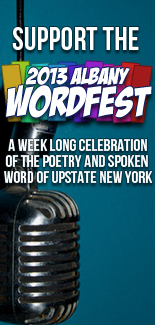
“What a great way to celebrate National Poetry Month right here in Albany. With a full week of poetry and spoken word, there is something for everyone.” Thom Francis, Albany Poets President, said, “Whether you would like to take in a featured performance, celebrate the launch of a new, local literary journal, attend a regional poetry slam, or be part of one of the largest annual open mics in the area, the Albany Word Fest is the place for you.”
Avery Stempel, Albany Poets board member, adds, “Word Fest is a celebration of spoken word spanning a full week of events that incorporate the diverse forms of expression ranging from impromptu skits to rehearsed and choreographed slams. Poets, philosophers, performers: all are welcome in this growing community of Albany writers. I am excited to be a part of the team coordinating the festivities this year!”
The week will kick-off with the launch of Albany Poets’ brand new literary journal, Up The River. Editors Jill Crammond and Keith Spencer have been culling through hundreds of submissions and will debut their selections for the first issue on Sunday, April 14 at McGeary’s. The evening will also feature performances by some of the poets published.
On Monday, April 15 we head to the UAG Gallery on Lark Street for a night of poetry and spoken word from Poets Against Fracking featuring Band of Bards, a community of Binghamton area writers, artists, and activists who have turned their talents toward helping to preserve their community against the threat of hydraulic fracture gas drilling in New York State and beyond.
Also on Monday night, Jill Crammond will be hosting an open mic for students in grades 5 – 12 at the Bethlehem Children’s School in Slingerlands. This will be a great opportunity for young poets and writers to share their work with others.
On Tuesday, April 16 the festival continues with the Nitty Gritty Slam at Valentines. For the Word Fest edition of NGS, Mojavi and Thom Francis will present the first ever Haiku Battle. This long awaited event will finally make its Albany debut on the Nitty Gritty stage.
For Wednesday night, April 17, the Word Fest heads over to The Linda – WAMC’s Performing Arts Studio on Central Ave for a screening of the film Louder Than A Bomb, “a film about passion, competition, teamwork, and trust. It’s about the joy of being young, and the pain of growing up. It’s about speaking out, making noise, and finding your voice. It also just happens to be about poetry.”
Thursday, the poetry comes back to the Social Justice Center with the Third Thursday Poetry Night hosted by Dan Wilcox. This monthly poetry series welcomes poets to step up to the mic and share their work along with featured performers from the College of Saint Rose.
Friday night features two poetry events with the annual Word Fest Open Mic taking place at the UAG Gallery on Lark Street while UGT will be happening at The Linda on Central Ave.
This year Albany Poets is going back to a familiar place for the Word Fest Open Mic. We are returning to the UAG Gallery on Lark Street for this annual Word Fest tradition. The UAG has hosted the Open Mic five times in the past (2006 – 2010) and it is great to be back home for the 2013 Word Fest.
Poets who wish to participate in the open mic can sign up online by going to the signup pageuntil Sunday, April 14. Performers will also have a limited opportunity to sign up at the event itself. Each poet will have 10 minutes to share their work. The open mic is open to all poets and spoken word artists with no style or content restrictions.
Meanwhile, right up Central Avenue, at The Linda, Urban Guerilla Theatre will be presenting the second Skit Happens show. UGT President Mojavi explains, “ ‘Skit Happens, Too’ is an eclectic blend of poetry, comedy and skits. UGT is dedicated to bringing you funny, incredible performances and even crazier skits. We continue to bring you the best in poetry, comedy and performance as part of the 2013 Albany Word Fest.”
Finally on Saturday, April 20, the Word Fest comes to an end with the first ever Word Fest Invitational Slam at Valentine’s starting at 6:00pm. Albany Poets, Frequency North, and Urban Guerilla Theatre are proud to welcome six teams from all over the Northeast to compete in this event. Admission for this event at Valentine’s is $10.00 in advance / $12.00 at the door. This event is 18+ (21+ to drink) with a picture ID required. Tickets will be available online beginning on March 14.
Additionally, all throughout the week, Albany Poets will be publishing local poetry on their website as part of the Word Fest Online Open Mic. Poets who wish to participate are encouraged to send their poems to albanypoets+submissions@gmail.com with “Online Open Mic” in the subject line, starting Sunday, April 7.
The 2013 Albany Word Fest is sponsored by Albany Poets, Hudson Valley Writers Guild, Frequency North, Urban Guerrilla Theatre, Valentines, McGeary’s,Upstate Artists Guild, and the very generous donations of supporters of the arts in upstate New York including Matt Galletta, Dan Wilcox, Howard Kogan, Kenneth Salzmann, and Bob Sharkey.
Latest Word Fest News
2013 Albany Word Fest – The Word Fest Kick Off Party and Launch of Up The River on Sunday, April 14
April 3, 2013 2:36:40 PM EDT
Getting Closer… Two Weeks Until the 2013 Albany Word Fest
April 2, 2013 10:44:56 AM EDT
2013 Albany Word Fest – Poets Against Fracking featuring Band of Bards on Monday, April 15
March 29, 2013 9:55:17 AM EDT
2013 Albany Word Fest News – New Events, New Features, and How You Can Help
March 14, 2013 10:26:52 AM EDT

The Albany Word Fest is © 2013 Albany Poets. All Rights Reserved.

In his grief-stricken dreams
he sees h...
In his grief-stricken dreams
he sees her, joy and pain.
He reaches out to touch,
but her figure slips through
his desperate arms
and is gone, lost forever,
drifting on the wings of sleep.
~ Aeschylus, Agamemnon

Burn Brightly
~ R.M. Engelhardt ...more
- R.M. Engelhardt's profile
- 23 followers


